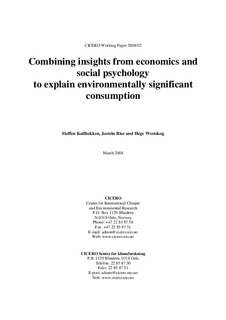Combining insights from economics and social psychology to explain environmentally significant consumption
Working paper
Permanent lenke
http://hdl.handle.net/11250/192284Utgivelsesdato
2008Metadata
Vis full innførselSamlinger
- CICERO Working Papers [167]
Sammendrag
In this paper we propose a comprehensive model for environmentally significant consumption. The immediate purpose is to improve our ability to understand such consumption. The underlying purpose is to improve our ability to predict consumption and to improve our policy recommendations, in particular with respect to designing effective policy instruments. The model draws on insights from economics and social psychology, and attempts to synthesize these theories with respect to explaining environmentally significant consumption. We believe that the model adds three important elements to existing models of environmentally significant behavior:
• It focuses more specifically on consumption. This links more directly to the environmental impact of the behavior than other types of models of environmentally significant behavior.
• It draws more heavily on insights from economics, both by relating the expectancy-value construct to the characteristics of goods, and by including cost as a separate factor.
• It opens up a wider hypothesis on policy instruments through showing the potential for the use of a diversified policy (information measures and incentives).
